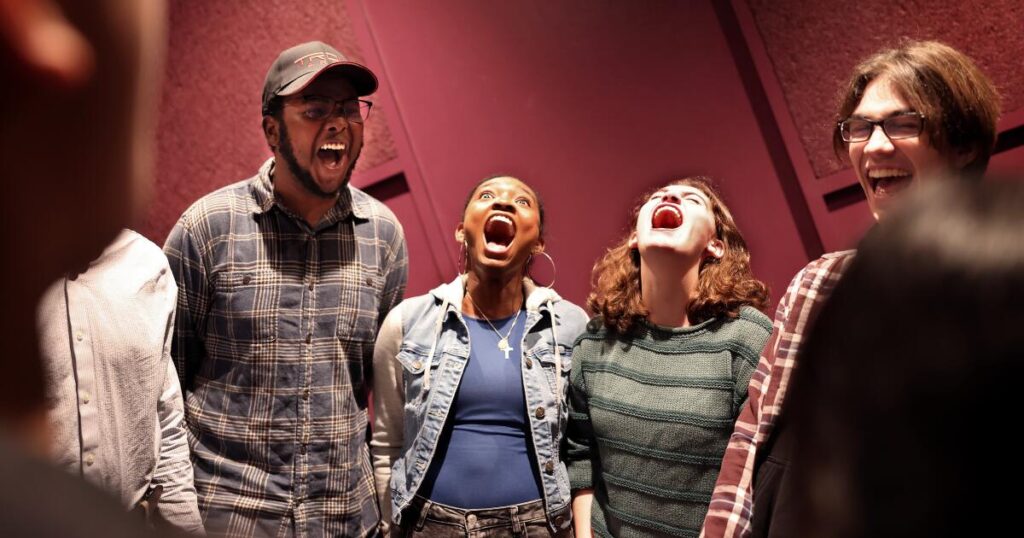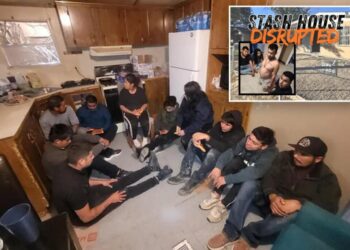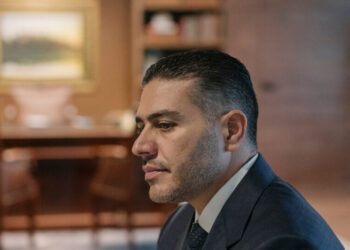Under the harsh overheard lights of a small theater stage, the comedian commandeered the microphone and unfurled a short set laced with jokes about poop anxiety and penis size.
“My preschool had these communal restrooms — just five toilets lined up … no barriers, no doors. It was like a Roman bathhouse,” the performer said, drawing a laugh from one woman in the second row.
She was the comedian’s professor. And he was a USC student.
Junior Joshua Ou was performing in a class that may seem unlikely in an era of fraught debate over what can and can’t be said on college campuses: “Introduction to Stand-Up Comedy.” It’s a core offering taken by students minoring in comedy performance.
Wait. You can minor in comedy at USC?
Launched in fall 2015 by the university’s School of Dramatic Arts, the comedy performance minor also includes classes in improvisation and magic, among other subjects. Enrollment is modest: About 15 to 20 undergraduates each academic year.
Some of the students are seeking careers as actors, among other entertainment-related pursuits, making the minor a sensible specialization. But many others are interested in careers in medicine, science and engineering. For them, comedy offers a chance to develop skills that could be useful in their hoped-for professions — and in their daily lives.
That’s the case for Ou, 20, who is majoring in human development and aging and plans to pursue a career in nursing.
“I find that this class has taught me a lot [about] self-confidence and how I portray myself,” he said. “I’ve learned more than just the performance aspect.”
Associate professor of theater practice Zachary Steel, who also is the director of comedy at the School of Dramatic Arts, said the classes teach students skills that are useful “in any work environment … where you need to take on a leadership role and figure out ways to connect with the people you’re collaborating with.”
Beyond intro to stand-up, there are other courses for the minor that stand out. Like the one on medical clowning. Taught by Steel, the class helps students learn how to interact with hospital patients with levity and humor. Along the way, they are taught how to juggle and perform magic tricks. Steel said some of his pupils have gone on to graduate from medical school.
“They have told me how much the medical clowning work has enriched their ability to converse, communicate and connect with patients — it helps so much with their bedside manner,” he said.
That’s not to say the minor doesn’t prove head-scratching — especially among parents footing the bill for a USC education.
When senior Malaya Galindez, 21, who aspires to be a physician and is majoring in health and human sciences, told her parents that she intended to minor in comedy, her father was surprised.
“At first,” Galindez said, “my dad was like, ‘Oh no. Why am I paying tuition for this?’”
Who pursues the minor
USC, which also offers a writing-focused comedy minor in the School of Cinematic Arts, claims some famous alums who are comedians or comic actors: Will Ferrell and John Ritter, as well as former “Saturday Night Live” cast members Ego Nwodim, Kyle Mooney and Beck Bennett. None of them minored in comedy in the School of Dramatic Arts — the program didn’t exist when they were students.
These days, many of those minoring in comedy don’t aspire for Hollywood limelight. Senior Arjun Bedi, a computer science major, initially took a class about comedy performance to satisfy a general education requirement.
Before he selected comedy performance as a minor, Bedi, who grew up in New Delhi, felt he had to speak to his parents about it — considering USC tuition and housing can reach $99,139 a year.
“Classes aren’t free. It had to be worth it,” Bedi said. “My parents really encouraged me to take it. We thought this minor would provide the best training to be a confident part of a corporate environment. So much of the workforce involves … interpersonal skills, communication, leadership.”
Galindez considered herself a “casual fan of comedy” and initially took a class about comedy performance taught by Steel. She felt the minor would offer a good change of pace from her other, “intensive” coursework.
As she eyes a career in medicine, Galindez sees the value of using comedy to connect with “somebody who’s in a vulnerable state.”
“Both fields are just so human-centered,” she said of comedy and medicine. “The basis of both is you’re really just trying to understand another person and, ultimately, brighten up their day.”
Galindez said her family, hesitant at first, eventually came around. Her dad is a physician, and she said he told her that humor is “one of the best ways to connect with a patient.”
“They love telling people, ‘Oh yeah, our daughter is studying comedy,’ ” she said.
What’s a stand-up class like?
Satisfying the requirements of the 16-unit comedy performance minor means taking five to seven classes.
Though it is not a requirement, most students pursuing the minor wind up taking the introductory stand-up class with Judith Shelton, who has taught at USC since 2016 and is an assistant professor of theater practice in comedy. She appeared on “Seinfeld” and voiced a character on “The Great North” on TV for five seasons — and reminds her students that “comedy is not safe.”
During a recent class, six of the 11 students were chosen at random to perform short sets. The humor was sometimes sophomoric — and edgy. Irreverent too. Topics included a “homophobic robot” and being “diet Black.”
In one extended bit, a student compared part of his anatomy to an edamame and a thumb tack. In another, a student referred to the promiscuity of his teenage sister in vulgar terms.
In that case, the student received gentle but firm criticism from Shelton, who told him, “It’s not easy for me to laugh at that joke.”
She urged the performer to consider, “Why am I saying this? Is it just to get revenge?”
Shelton encourages her students to mine their lives for material.
Jayden Ozoemena, a senior studying public relations and advertising at the USC Annenberg School for Communication and Journalism, described being hit by a car while on a scooter during his in-class routine. He lamented that he was not struck in “sexy way.”
Instead, he said, “I had to brace for impact like a damn quarterback. … It’s all good — because this is going to fund my Beyonce concert money.”
Shelton knows the lives of college students can be messy. At the start of the semester, she explains to the class that she’s a “mandated reporter,” which means she is obligated to report information related to suspected child abuse, among other things.
She also offers practical advice: “If you can’t laugh about it, it’s too soon to bring it onstage.”
There’s a culture of paying dues in stand-up comedy. A newbie may have to endure performing at the seediest of clubs before moving on to bigger and better opportunities. It’s hard to replicate that environment in a classroom. The stand-up class is held at the Stop Gap Theatre at USC’s Dick Wolf Drama Center. With seating for about 100, it features stage lights that give the space something of a club-like vibe.
After students performed, Shelton offered feedback. When one performer delivered a few lines in a deafening shout, she said, “Remember … if you are screaming, pull that mike away.”
This fall’s “Introduction to Stand-Up” class will culminate with open-to-the-public shows on Dec. 4 and 5 at the Stop Gap. They’re free.
Looking ahead to those events, Shelton said the Thanksgiving holiday — with its awkward family gatherings — could offer comedic inspiration.
“Who knows what will happen over Thanksgiving,” she said, “but don’t surprise me with a crazy set that is racist.”
Everyone laughed.
The post Why USC students who want to be doctors and engineers are minoring in comedy appeared first on Los Angeles Times.




